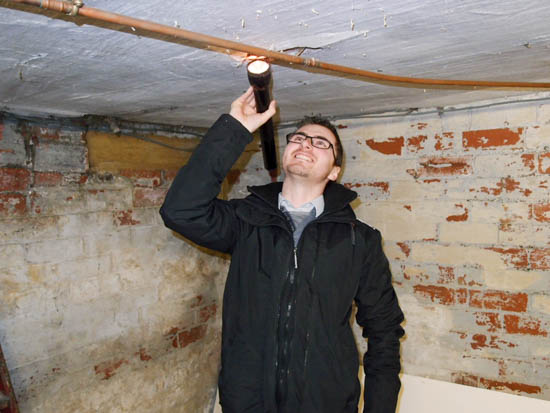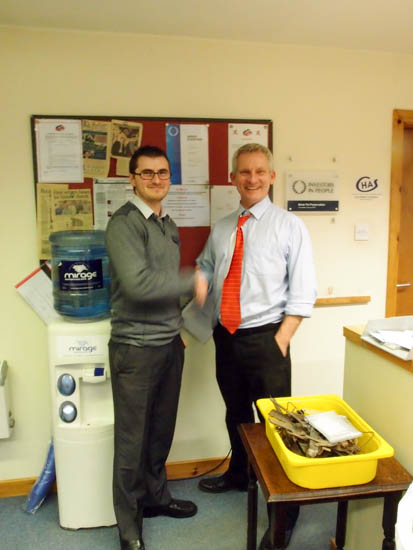What drives Property Care Association membership?
The Property Care Association has its roots in the old British Wood Preserving and Damp-proofing association. In fact the associations ancestry goes back over 80 years! All the history in the world won’t guarantee any organisation’s future; think Woolworths, Northern Rock and Pan Am… The last credit crunch hit PCA members hard, just like all other businesses. However, membership not only held but is growing year-on-year.
To find out why, I thought I’d catch up with one of 2015’s newest PCA members; CK Walker, Damp and Timber. The company is one of the growing numbers of small businesses attracted to PCA membership and I wondered why they would put themselves through all the hard work and expense of a membership application. I wanted to know what makes damp-proofing and preservation companies aspire to PCA membership and, what makes them tick.
Paul Walker CSRT is the son of the business founder and met me for a chat about these issues. CK Walker is a real family business, started by Paul’s Dad, with office assistance from mum, who works part time in the business too. Together Paul and his dad have been running the business since 2003, though Paul spent some time since then as a special constable. Paul, can you take up the story?
“The family firm has been my life for over ten years and whilst I enjoy the site work, I came to realise that to sustain the business long term, we needed to grow our customer base and extend our knowledge. I know some great PCA members and admire the work they do and the standards they work to; I could see that we could learn a lot from them, if we joined the PCA too”.
Like very many specialist firms, Paul has a good relationship with his principle supplier of remedial products. He turned to Safeguard Europe for advice and by some thoughtful networking; Paul was introduced to PCA members Dave Cook of Cook group and myself. Over coming months Paul enjoyed mentoring sessions with David and site visits, as well as surveying with us both. I was impressed when I met Paul and could see that he was just the type of person I’d recommend to my family or friends – honest, hard working and always learning. Dave was similarly pleased.
Why join PCA though, I asked Paul, you’ve been doing okay outside membership?
“I could see that there were higher levels we could aspire to, it’s not just a badge, like some trade associations; the PCA is a vibrant group of people working together to get better and being helped along by the PCA’s superb training facilities and management. Yes, we were doing okay, but just like lots of businesses, it’s easy to end up working in a bubble and then you can miss so many opportunities- I could see that”.
I agree with that and have seen the explosion of training opportunities PCA have engendered for members over the past decade. I asked Paul which areas interested him most and why?
“Damp proofing and timber treatment is in our blood as well as our name, but until the last few years I had little idea of how condensation and mould problems would proliferate through the housing stock, I can say that the PCA condensation and damp training is great for that and I love dealing with these problems for clients” I asked Paul how much fun there could be in condensation… I mean fun, really?
“Okay so environmental testing for RH and dew point may sound a bit nerdy, but this area is one, in where you can make such a wonderful difference for clients, I mean, one week their windows are streaming and mould is thriving and the next, they are ringing up, delighted that their previously stubborn problems are gone – it’s great”.
So PCA membership helps you add further specialty to the firm and makes it more sustainable? “Yes” says Paul, “I’d say that in the winter months – the so called ‘condensation season’ we are kept much busier on work we would have shunned a few years back”.
Membership costs money and time too. These condensation activities are not exclusive to members – there must be something else?
“Well, the thing is that for years we’ve worked hard and PCA membership puts us firmly on the map as a real specialist company – rather than a self validated one”. I asked Paul to explain this:
“Consumers these days are bombarded with adverts and promises. The bad experiences they have are splashed all over the media – we don’t get bad press because we do a good job, but cowboys and criminals don’t tell consumers that they are bad people, so to a degrees consumers only have our word that we are a good, sound specialist business they can trust. PCA membership is something we can hold out to them, with real pride; it’s hard to gain and maintain membership and with the example others have set – we want to excel as an exemplary PCA member. Take the condensation training for example – Positive input ventilators and such are freely available to all – but where is the training? PCA ensure we get great fundamental knowledge, so that we can target treatments which work for clients – it’s not a sales organisation, more of a solutions one”.
Paul outlined some other benefits he’d identified “The PCA’s range of features is great too, the web site has already passed me some good inquiries from clients in my area and I have the PCA promise and PCA certified survey scheme to offer them. Commercially, it works and I can hold my own with other companies large or small – I have the same range of insurance backed guarantees and I work to the same code of ethics”
.
So what about the future, now you can tick the PCA box?
“Well, this is a firm foundation for future growth. I already offer damp proofing and timber treatment across Derbyshire and into Nottinghamshire. We’ve added condensation and mould control to these and I’m hoping to complete the Bpec domestic ventilation engineers course soon. I’m booked onto the SPAB training day at PCA and I know that this will give me some good information I can use, when looking at traditional buildings. The PCA is a constant learning and development tool for us – much more than simply a trade association. I hope to enroll a new employee on the PCA apprentice scheme soon and attend the structural waterproofing course and eventually CSSW. There’s no doubt that as we develop the business, the PCA will play a central role, both as trainers, supporter and a source of great networking and mentoring opportunities too.
Is gaining PCA membership easy and what is involved. Is it just a three day course and a fee to pay, I asked?
“If it was easy, then everybody would be a member, I was well prepared so I wasn’t surprised how robust it was” says Paul. “First I had to ensure that I had achieved the CSRT standard. This is three modules (damp – timber and health, safety and law), which include two aural sessions and a timber identification session, in addition to the three papers to sit and pass. This is not even part of PCA membership as such – it stands alone but is a must for any contractor member to have this qualification”. The three days prep courses are fantastic and leaned so much. However, those who think that the day courses are all you need to do are in for a shock. There’s loads of work to do to get all the information in place to pass the exam. I was told that the pass rate is only just over 50% and I can believe it – it’s very demanding”.
Paul explained more of the process “Pre-qualification standards include having the correct insurance to protect clients, sending in sample reports, trading accounts and experience. Only then do the PCA send along an assessor to complete an audit. The audit was a bit nerve-racking. An independent surveyor visited and went through all our procedures; accident book, complaint procedures, administration, reports, work records, materials, vans, site, storage… it went on and on. After that there was a delay before I was taken through some improvements the PCA wanted to see and once I’d made these, I was accepted – I’m really chuffed for my Dad, mum and the whole team… just watch us fly now”.
My thanks go to Paul for a fascinating look into the PCA accreditation process and for being so frank about his hopes and aspirations for the future. I wish CK Walker Damp and Timber all the best and expect that their PCA membership will bring huge dividends to the business, whilst improving their services to clients in the future. I find it heartening that the PCA is attracting talented people like Paul and it’s a great indicator for clients looking for damp proofing and associated preservation services; knowing the efforts PCA members must put in to earn that coveted PCA membership.
Dry Rot.


Bryan
A very fascinating piece indeed. This will definitely be a link for anybody wishing to pursue a professional preservation career.
Well done.
As we have seen since this piece was written, Paul has already made another PCA achievement.
Robert Deary of Safeguard Europe Ltd